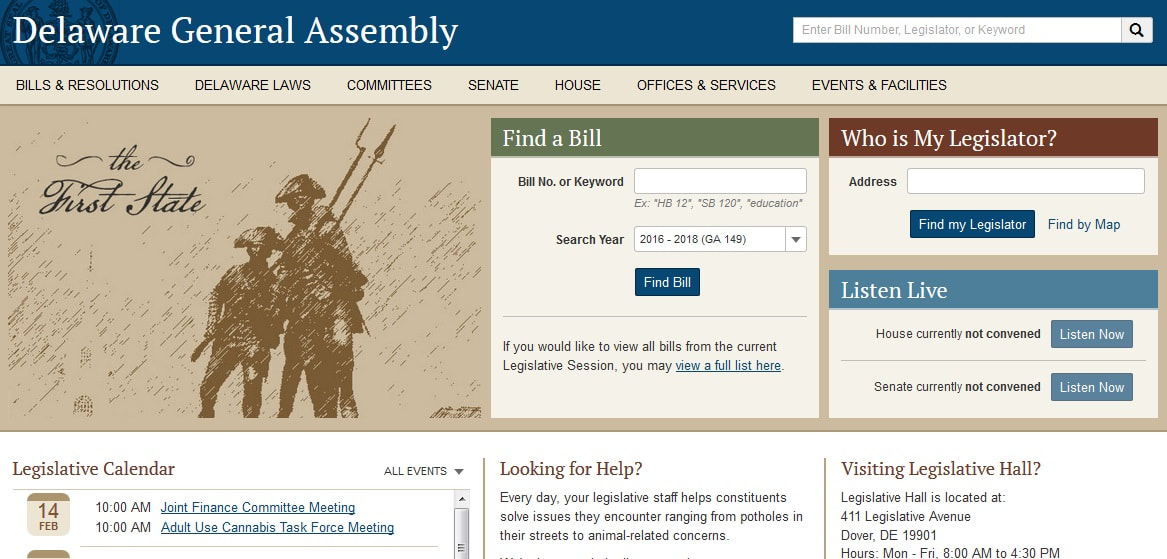Using the General Assembly Website
legis.delaware.gov is Delaware's go-to site for tracking bills, listening to live streams, finding your legislator, checking the House and Senate agendas, looking up committee hearings, and most other legislative information. Click here or on the image below to go to the website.
how the senate works
How does a Senate bill become a law?Laws begin as bills. Before a bill can become a law in Delaware, it must be approved by both chambers of the Delaware Legislature, and be signed by the Governor.
Beginning as Ideas The ideas may come from a Senator, Representative, lobbyist, or a citizen. Citizens who have ideas for a bill may contact their senator to discuss their ideas. If the idea is agreed upon, more research is conducted and the bill is put into draft form. Proposal of the Bill A Senate Bill can be sponsored by any Senator, and often will have one or more cosponsors. Introduction of the Bill The Senate Bill is assigned a number by the Secretary of the Senate and is assigned to a committee. Committee Hearing The committee members and the public have a chance to voice concerns with the bill at the committee hearing. The committee members then vote on whether a bill should be released back to the Senate. A bill can be released with either "favorable" or "on its merits" votes. Report & Ready List The bill, after being released from committee, is read in on the Senate floor. The bill is now ready to come before the Senate and is placed on the ready list. Debate on the Bill The bill is placed on the Senate agenda by the President Pro Tempore and is debated on the floor. During the debate, any Senator may voice agreement with or disapproval of the bill. A Senator may call a witness or a legal expert to testify at this time. Senators may also recommend changes to the bill, or may bring up amendments themselves. The Vote All Senate legislation must be voted on using the roll call method. Each senator's name is read, and he or she votes with one of the three following options: yes, no, or not voting. A senator may change his or her vote after roll call is complete but must do so before the Secretary of the Senate has declared the bill either "passed" or "having failed to receive the required number of votes." Process is Repeated The process is repeated with any passed Senate bill, beginning with a committee assignment, in the House of Representatives. The House may pass the bill, defeat the bill, or send it back to the Senate with amendments. (The Senate must re-vote on any Senate bill that is returned amended from the House.) Bill Becomes Law After a Senate bill has passed both chambers, it is received by the Secretary of the Senate. Once the Secretary of the Senate delivers the bill to the Governor, it can become law in one of three ways: the Governor can sign it into law; the bill can be enacted without a signature if the Governor does not return it to the General Assembly within ten days; or the General Assembly can override the Governor's veto with a three-fifths vote in both chambers. *The process is the same for the House of Representatives; all House Bills are first introduced in the House, and the process moves in the same manner from there on. |
Types of legislation:Bill
The most common legislation. It is used to insert or delete text from the DE Code, the DE Constitution, or a municipal Charter. Substitute Bill This completely replaces an original bill. When a substitute bill is introduced, the original bill and any amendments become void. Amendment Amends a piece of legislation; either typographical or content errors. Resolution (simple) This legislation only needs to be passed by the originating chamber. These are used to establish procedure within a chamber, create task forces, or declare the "sense" of a chamber on an issue (i.e. congratulate, express condolences). Does not have to be heard in committee and does not have the force of law. Concurrent Resolution Used to accomplish for the entire General Assembly what a simple resolution does for one chamber. Does not have to be heard in committee and does not have the force of law. Joint Resolution Used when the General Assembly wants to express something in conjunction with the Governor. The joint resolution must go through committee unless rules are suspended. This piece of legislation has the force of law while in effect. Oath of Office
Article XIV of Delaware's Constitution provides the oath that each Senator swears to uphold:
"I, (name) , do proudly swear (or affirm) to carry out the responsibilities of the office of (name of office) to the best of my ability, freely acknowledging that the powers of this office flow from the people I am privileged to represent. I further swear (or affirm) always to place the public interests above any special or personal interests, and to respect the right of future generations to share the rich historic and natural heritage of Delaware. In doing so I will always uphold and defend the Constitutions of my Country and my State, so help me God." No other oath, declaration or test shall be required as a qualification for any office of public trust. |
